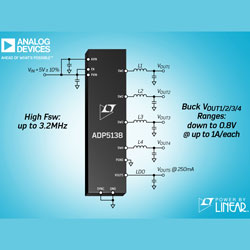ADI has released its ADP5138 linear power supply, which is an automotive grade, high efficiency, 3.2MHz synchronous quad output buck regulator with unique fixed frequency, peak current mode, and PWM control architecture to reduce conduction and radiation. emission. The device's high efficiency step-down regulator enhances thermal management, operates at output voltages as low as 0.8V, and delivers up to 1A continuous output current from each channel. They also integrate 250mA of low output noise (20μVRMS from 10Hz to 100kHz) and high PSRR (61dB at 1kHz) LDOs to power noise-sensitive devices. The high degree of integration and integration of features, as well as the compact 4mm x 4mm LFCSP package, make it ideal for automotive, industrial and instrumentation systems, and space-constrained DC-DC point-of-load applications.
The device operates at a fixed PWM switching frequency of 3.2MHz or can be synchronized with an external clock from 2.8MHz to 3.5MHz, which is outside the AM band. In addition, this high switching frequency reduces the size of external components, which reduces the footprint of the solution. The four buck regulators are 90 degrees out of phase with each other, which reduces the input ripple current and the size of the input capacitor, and reduces the system's EMI. Additional protection includes OCP and TSD.
The device and automotive-certified version ADP5138W are packaged in a flat (0.75mm) compact 28-lead 4mm x 4mm LFCSP package with exposed metal pads on the back for excellent heat dissipation. These devices have an operating temperature range of –40C to 125C (junction temperature).
